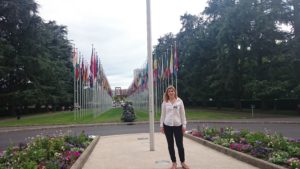 On Christmas Day, 2015, in Klaipeda, the third biggest city in Lithuania, I witnessed a racist attack; more specifically, an afrophobic attack. My companion of African descent was insulted by a complete stranger for no other reason than “looking different”. The incident left deep marks and raised questions of whether it reflected wider views and problems in the country, and if there was an adequate protection against such incidents. It encouraged me to study the situation of people of African descent in Lithuania for my Masters dissertation. Here, I would like to share the main findings of my research.
On Christmas Day, 2015, in Klaipeda, the third biggest city in Lithuania, I witnessed a racist attack; more specifically, an afrophobic attack. My companion of African descent was insulted by a complete stranger for no other reason than “looking different”. The incident left deep marks and raised questions of whether it reflected wider views and problems in the country, and if there was an adequate protection against such incidents. It encouraged me to study the situation of people of African descent in Lithuania for my Masters dissertation. Here, I would like to share the main findings of my research.
In 2013 the United Nations Human Rights Council adopted a term “Afrophobia”, acknowledging that People of African Descent face disproportionate and targeted acts of racial discrimination — direct, indirect, institutional and structural — and physical violence, including hate speech and other forms of harassment. In 2015 the United Nations announced a Decade for People of African Descent, providing a momentum for various actors to take measures to improve the human rights situation of one of the population groups most affected by racism. The pronouncement of the Decade and the adoption of the term, are some of the many attempts to improve the visibility of the challenges that People of African Descent face in Europe and globally.
In Lithuania Afrophobia is hidden by the lack of data. First, the lack of data on the numbers of People of African Descent in Lithuania makes it very difficult to establish the scope of the problem. Second, there are major gaps in the collection of statistical data related to hate crime, including under-reporting of racist crimes and a failure of law enforcement officials to recognise racist motivations.
Public opinion polls indicate that Afro-descendants are among the most disliked “new minority” groups in the country, even though the majority of Lithuanians had no contact with the members of the group. Whilst discriminatory attitudes noticeably decreased in the country between 2010 and 2013, they worsened towards People of African Descent. 2013 polls showed that 53.6 per cent of those surveyed expressed negative attitudes towards the people of African descent and 58.7 per cent of the respondents did not want Afro-descendants to migrate to Lithuania.
The available hate crime data indicated that the most targeted for hate crime  minority groups in Lithuania were Jewish, Polish, Muslim, Roma, LGBT and Black people. A human rights lawyer, I interviewed, stated that the majority of complaints about racist hate speech he received were from the People of African Descent.
minority groups in Lithuania were Jewish, Polish, Muslim, Roma, LGBT and Black people. A human rights lawyer, I interviewed, stated that the majority of complaints about racist hate speech he received were from the People of African Descent.
I also found that racism against People of African Descent existed at the highest political levels, including racist statements by prominent politicians. It was shocking to learn that in 2010 the Supreme Court legalised the term “Ni***r”, concluding that the term is not racially discriminatory when simply referring to a Black person.
During my research to understand why Lithuanian’s had such negative views about People of African Descent, I realised that a self-image of Lithuanians as “innocent sufferers”, emphasising the suffering aspect of Lithuanian history – domination and forceful assimilation by Poles and Russians, continues to manifest itself in the form of a distinct distrust of outsiders, xenophobia and racism.
The available hate crime data, public opinion polls and high level racism indicate that Afrophobia is a significant issue in Lithuania. However, there is a lack of political will in Lithuania to tackle racism; law-enforcement authorities lack the competence and/or will to recognise racist motivation when investigating hate crimes; and the lack of statistical data on ethnic and racial discrimination are some of the key obstacles to assessing the extent of racism and Afrophobia in Lithuania. As a result, Afrophobia is disguised and People of African Descent face a vicious cycle of racism.
I was pleased to find that a number of Lithuanian NGOs attempt to improve the visibility of the issue through public education, and a combination of local and international campaigns. NGOs use international and regional instruments to influence structural changes. My hope is that the Decade will not only improve the visibility of Afrophobia but will also result in a positive change for People of African Descent around the globe.
Danguole Kleinaityte is MA in Understanding and Securing Human Rights 2016 graduate from School of Advanced Study, University of London. She currently works for Dalit Solidarity Network UK and International Dalit Solidarity Network, campaigning to end caste-based discrimination in the UK and worldwide.

